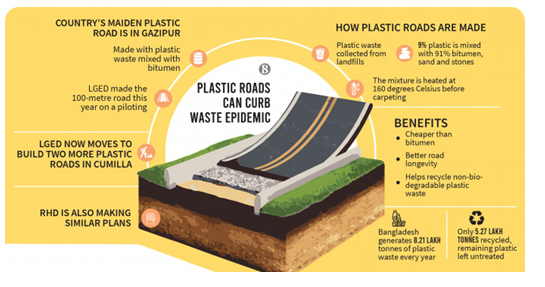

8th August 2024 (7 Topics)
Context
Union Road Transport Minister Nitin Gadkari has mentioned that the government will allow the mixing of lignin up to 35% in petroleum-based bitumen for road construction as a large part of it is imported from other countries.
About Bio-Bitumen:
- Bitumen is a black substance produced through the distillation of crude oil and is widely used for making roads and roofs.
- Bio-bitumen is a bio-based binder derived from renewable sources such as vegetable oils, crop stubble, algae, lignin (a component of wood) or animal manure.
- Bio-bitumen production has been developed as a local alternative to petroleum bitumen, thereby reducing environmental impact.
- It is used in the construction of roads and roofs. It is used as a direct replacement, modifier, and rejuvenator.
- Straw will be used in making roads with bio-bitumen technology, which can reduce pollution.
Properties and Uses:
- The main uses of bio-bitumen are in airtight structures, such as a waterproof binder for road construction (asphalt floors), buildings, and marine structures.
- Due to its high adhesive and waterproof quality, it has been developed as a replacement medium for impermeable and traditional binders in structures.
- Uses of bio-bitumen as an alternative to petroleum bitumen : Bio-bitumen in India can be used as a viable alternative to petroleum bitumen in construction of structures that are natural and environmentally safe. Construction of national highways is expected to be around 12,300 km in the financial year 2023-24, Which is equal to approximately 34 kilometers per day.
Need for Bio-bitumen in India:
- Reducing import dependence:Its primary objective is to replace imported bitumen with domestically produced bio-bitumen in the coming decade, thereby reducing foreign exchange expenditure.
- Addressing environmental concerns: Bio-bitumen production aims to reduce environmental issues associated with stubble burning by using biomass and agricultural waste as feedstock.
- Promoting sustainable practices:By using bio-based materials, this initiative supports sustainable road construction practices and is in line with global environmental standards.
- Technical development and experimental studies:The Central Road Research Institute (CRRI) is collaborating with the Indian Petroleum Institute to conduct a pilot study on a 1 km road using bio-bitumen.
Major challenges of bio-bitumen production in India:
- Cost Effectiveness: Currently bio-bitumen production can be more expensive than conventional methods.
- Long term Performance: More extensive field trials are needed to assess the long-term performance and sustainability of bio-asphalt.
- Standardization: For bio-bitumen to be widely adopted, it is necessary to establish clear standards and specifications for it.
- Other available alternatives:
- Steel slag road technology:
- Steel slag is a new method of using waste generated during steel production to create stronger and more durable roads.
- Companies in Hamburg, Germany developed 100% recycled asphalt pavement (RAP) to reduce costs, save energy, and reduce carbon emissions.
- Plastic Road:
- India has constructed a total of more than 2,500 kilometers of wide plastic roads.
- Even at the global level, plastic roads are being constructed in more than 15 countries.
- For example, in Ladakh it is mandatory to use at least 10% plastic waste for road construction.
- Steel slag road technology:
More Articles



